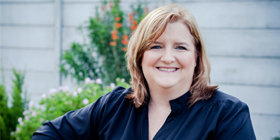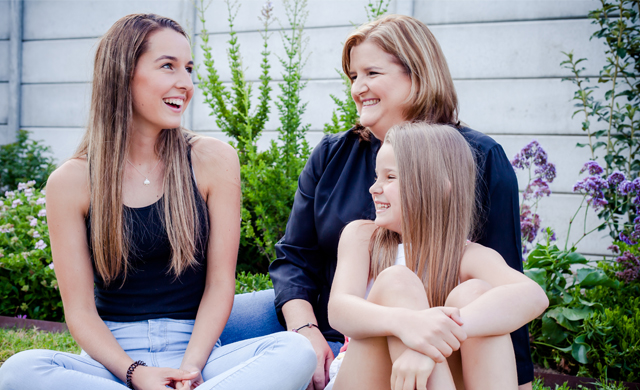The Upton family’s journey with GBS, a life-threatening syndrome

Its cause is unconfirmed, symptoms can be misleading and it can occur at different ages. What is certain is that Guillain-Barré syndrome (GBS) is life-threatening. Discovery Health Medical Scheme member Ashleigh Upton talks about their journey with this disorder in which the body’s immune system attacks part of the nervous system.
The first symptoms of GBS often include numbness or tingling in the fingers and toes or around the mouth. It can, over a matter of hours or days, develop into muscle weakness, difficulty speaking, chewing or swallowing and not being able to move the eyes. What makes GBS more dangerous is that this muscle weakness can spread and interfere with breathing, and in some cases, heart rate and blood pressure. “It was a shock seeing him go from a normal, healthy man to one completely paralysed,” says Ashleigh about the first time her husband, Mark Upton, was diagnosed with GBS.
It is GBS
It first happened in 1999. Mark, who was 31 at the time, had a stomach bug just a few days before he started experiencing heavy legs and extreme exhaustion. Because they just had a daughter, Kyra (who was six weeks old), they both thought he was taking a toll from being sick and the responsibilities of a new baby. But by the morning he struggled to walk and experienced tingling in his hands. They knew he had to see his doctor.
Mark’s GP suspected GBS and speedily referred him to a neurologist. By the time he got to the specialist, Mark was weaker and had to use a wheelchair. With GBS confirmed, he was immediately admitted to Panorama Mediclinic where plasmapheresis treatment started.
Plasmapheresis separates plasma and blood cells, and puts the cells back into the body. This is specifically to remove antibodies in treating autoimmune conditions. In the urgency of treating him, Mark suffered a vein injury and a surgeon had to be called in. Not knowing what was going on, Ashleigh says, “I got some information from the internet.” But, this could not prepare them for how GBS would change their lives.
The long recovery
“Luckily, Mark did not need to be placed on a respirator,” says Ashleigh. For a month he felt every itch and irritation without being able to move to do anything about it. “Mark was determined to get better so he could come home to me and Kyra,” says Ashleigh. Over the next month, Mark started moving his fingers and toes. After two months in hospital, he was ready to go to a step-down facility where he received daily occupational and physiotherapy. What followed was a long and often tiresome four months of recovery.
Distressed by seeing Mark so sick, Ashleigh also had to return to work and manage Kyra’s care. All she could focus on was, “to remain positive for Mark’s sake.” Helpful friends, caregivers and Mark’s sister, who had just moved to Cape Town, were all there for Ashleigh. She visited Mark every day and took Kyra on weekends. Seeing the lighter side as Mark recovered, he and Ashleigh started a competition to see who would sit on their own first – Mark or their daughter Kyra.
Life after GBS
It took six months for Mark to be well enough to return to work. Looking back, Ashleigh says, “It was hard to juggle a new born and a sick husband. Luckily I didn’t have to worry about medical bills as well. Everything was covered.” Ashleigh also remembers that when she called to get an authorisation number, “the lady asked me if it was the first time Mark was diagnosed with GBS.” Her thoughts were, “I hope this never happens again.” The Uptons discussed this with the medical team, and because GBS is such a rare condition, they never expected its return. Mark was concerned initially, but “as he got stronger GBS became a distant memory and he put even more into his life,” says Ashleigh.
Mark was once again well and needed no further treatment or medicine. The only signs of how GBS affected him was weakness in his hands and shaking when he was tired. Their life returned to a normal routine. Six years after Kyra was born, and experiencing the after-effects of the pressure of GBS, Mark and Ashleigh had another daughter, Sarah. The family loved mountain biking, hiking and having fun together.
Which is exactly what Mark and his daughters, Kyra (now 16) and Sarah (now 11), did when Ashleigh sometimes had to work late. One such evening, the girls spent time with Mark downloading their favourite music.
In the early hours of the next morning, Mark woke up with a pain in his shoulder and severe stomach cramps. He asked Ashleigh to take him to the hospital. “I knew then it was serious,” says Ashleigh. The doctor ran tests, with GBS not being ruled out.
It happened again
It was 11 March 2014, 15 years after Mark first had GBS. By the time Ashleigh took care of the girls and returned to the hospital around eight in the morning, Mark – now under the care of a neurologist – had started to lose the feeling in his fingers and toes. “He knew it was GBS before the specialist confirmed it and asked me to sell his stand up paddle board,” she says. “This time it was severe.” Within an hour he had no feeling in his limbs and was moved to ICU. Within the next hour he could no longer move or speak and had to be sedated and placed on a respirator.
A month in ICU
The team of doctors kept Ashleigh updated, and “they were amazing,” she says. Mark received a course of intravenous immunoglobulin – a more updated treatment for GBS. But, there was no change and neurologists prescribed a second course. “Mark never regained consciousness and on 4 April 2014 nerve tests and an EEG sadly showed no improvement.” Although he had normal brain activity, the nerve damage was so severe he couldn’t even open his eyes. He was ‘locked in his own body’. Ashleigh got a second and third opinion with all doctors agreeing that recovery was unlikely.
As a last effort, neurologists wanted to try plasmapheresis but, “Unfortunately, Mark got septicaemia and went into renal failure,” says Ashleigh. It was his birthday on 11 April and “we tried to make his birthday as special as possible.” The hospital staff was very accommodating and allowed visitors all day. Mark Upton passed away on 13 April 2014.
“The last thing I said to him before he went to ICU was that I loved him and that we would get through this,” says Ashleigh who never thought they would lose Mark to GBS. She says their daughters have an understanding of what happened and support Ashleigh where they can. On the evening before Mark got sick he spent quality time with his daughters, and Kyra commented once, “It could not have been a more perfect last evening.”
Life after GBS – #livelikemark
Ashleigh says they miss Mark every day. She rides her bike for Mark, keeps a journal and started a hashtag #livelikemark which family and friends can use to post their fun times on social media.
The journey over the past year was made easier by having all Mark’s medical bills paid, which Ashleigh says were close to R1 million. He also had a life policy, which Discovery Life paid out in a few days. “You never know what life can throw at you. Although paying for insurance can seem expensive or unnecessary when all is well, having medical and life cover has ensured that we are not struggling.” Asked what advice she may have for others, she says, “One thing to always take into account is how the loss of a spouse’s income can affect you before retirement and to have enough insurance to cover that.”
Mark Upton took care of that. He will continue to inspire life’s fun moments through #livelikemark, as Kyra and Sarah send letter-filled balloons into the sky for Mark every Father’s Day. “All is well.”
